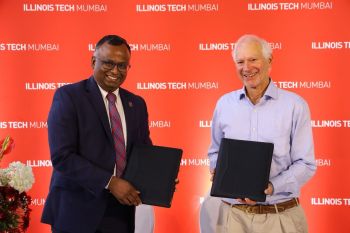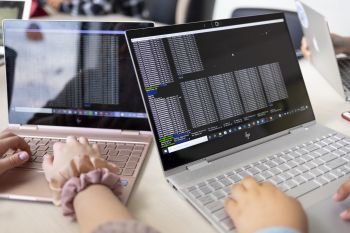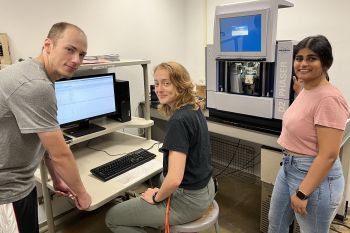Illinois Tech Assistant Professor Receives Award for Using Insights from Human Immune System to Strengthen AI
Inspired by antigen-generating B cells, Ren Wang aims to make AI systems more robust and address the ‘black box’ problem

CHICAGO—July 25, 2023—For his groundbreaking research in fortifying artificial intelligence systems with insights gained from the human immune system, Ren Wang of Illinois Institute of Technology has received the prestigious Ralph E. Powe Junior Faculty Enhancement Award from Oak Ridge Associated Universities (ORAU). Wang’s research may be used in the future to strengthen AI systems, making them more robust and resilient.
As AI has increasingly permeated our daily lives through technologies, such as ChatGPT’s natural language processing and facial recognition in smartphones, the technology’s vulnerability to attacks and errors has been exposed—including everything from self-driving cars crashing to T-shirts designed to foil facial recognition.
“This is a very dangerous phenomenon,” says Wang, an assistant professor in the Department of Electrical and Computer Engineering. “A very small perturbation can lead to a totally wrong answer. For example, the AI model might predict a speed limit sign when there is actually a stop sign.”
Because AI systems are like a black box—that is, it’s often not possible to know why an AI system makes any given decision—it’s difficult to develop techniques to keep them safe. To address this, Wang borrowed insights from the immune system—specifically the adaptive mechanisms of B cells, which are integral components of our immune defenses.
“B cells generate antibodies to defend against certain types of attack, and that attack could be any antigen,” says Wang. “We hope to learn from this whole process and to capture some important patterns that we can use to improve the AI system.”
Wang’s research is not limited to broad-based AI applications; he’s particularly focused on AI-driven power system applications, such as power system control and stability analysis, requiring a high degree of robustness. By integrating physical constraints into his immune-inspired learning approach, Wang aims to create robust AI models for complex power grids that necessitate less data and have a refined search space.
“I believe that this is a very novel idea,” says Wang, “and I believe this adaptive immune-inspired system will be very powerful.”
Wang is among 35 recipients selected from 167 applicants in 2023 for the Powe Award, which provides seed money for junior faculty members demonstrating exceptional promise in scientific research.
“It is a tremendous honor to have been selected as one of this year’s awardees, and I am immensely grateful,” says Wang.
The award follows another notable achievement by Wang, who recently received a Computer and Information Science and Engineering Research Initiation Initiative award from the National Science Foundation.
Image: The process of the adaptive immune system developing solutions to remove antigens inspires the computational system model for developing solutions to remove adversaries. Information collected from the power grid and physical constraints are used in the practical implementation of the computational system.
Illinois Institute of Technology
Based in the global metropolis of Chicago, Illinois Tech was born to liberate the power of collective difference to advance technology and progress for all. It is the only tech-focused university in the city, and it stands at the crossroads of exploration and invention, advancing the future of Chicago and the world. It offers undergraduate and graduate degrees in engineering, computing, architecture, business, design, science and human sciences, and law. Illinois Tech students are guaranteed hands-on experiences, personalized mentorship, and job readiness through the university's one-of-a-kind Elevate program. Its graduates lead the state and much of the nation in economic prosperity. Its faculty and alumni built the Chicago skyline. And every day in the living lab of the city, Illinois Tech fuels breakthroughs that change lives. Visit iit.edu.
Armour College of Engineering
Armour College of Engineering has been educating world-class engineers since the university’s founding in 1890. As future engineers who will innovate in the twenty-first century, Armour students learn the principles of the profession and work in an interdisciplinary environment that emphasizes hands-on learning, teamwork, and leadership, all through the lens of our four engineering themes—water, health, energy, and security—that highlight issues vital today and in the future. Armour is home to five departments and nine ABET-accredited undergraduate majors, which provide a wide breadth of exciting programs from which to choose. Illinois Tech alumni have advanced to careers as presidents of companies and professors at major universities—and have become members of the National Academy of Engineering, the highest distinction in the field.
Media contacts
Kevin Dollear
Communications Manager
Illinois Institute of Technology
Cell: 773-860-5712
kdollear@illinoistech.edu




